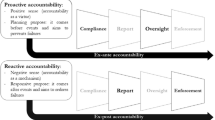Abstract
Computer ethicists have for some years been troubled by the issue of how to assign moral responsibility for disastrous events involving erroneous information generated by expert information systems. Recently, Jeroen van den Hoven has argued that agents working with expert information systems satisfy the conditions for what he calls epistemic enslavement. Epistemically enslaved agents do not, he argues, have moral responsibility for accidents for which they bear causal responsibility. In this article, I develop two objections to van den Hoven’s argument for epistemic enslavement of agents working with expert information systems.
Similar content being viewed by others
References
Bovens, M. (1998). The quest for responsibility: Accountability and citizenship in complex organizations. Cambridge: Cambridge University Press.
Bovens, M., & Zouridis, S. (2001). From street level to system level bureaucracies: how ict is transforming administrative discretion and constitutional control edited version of a paper presented at the 2001 PAT-NET conference. Leiden University, The Netherlands, 21 and 22 June.
Cohen, L. J. (1992). An essay on belief and acceptance. Oxford: Clarendon Press.
Goodin, R. (1995). Utilitarianism as a public philosophy. Cambridge: Cambridge University Press.
Hardwig, J. (1985). Epistemic dependence. The Journal of philosophy, 82(1), 335–349.
Milo, R. (1984). Immorality. Princeton NJ: Princeton University Press.
Tuomela, R. (1995). The importance of us: A philosophical study of basic social notions. Stanford CA: California University Press
van den Hoven, J. (1998). Moral responsibility, public office and information technology. In I. Th. M. Snellen & W. B. H. J. van de Donk (Eds.), Public administration in an information age: A handbook (pp. 97–112). Amsterdam: IOS Press.
Author information
Authors and Affiliations
Corresponding author
Rights and permissions
About this article
Cite this article
Rooksby, E. How to be a responsible slave: managing the use of expert information systems. Ethics Inf Technol 11, 81–90 (2009). https://doi.org/10.1007/s10676-009-9183-0
Received:
Accepted:
Published:
Issue Date:
DOI: https://doi.org/10.1007/s10676-009-9183-0




